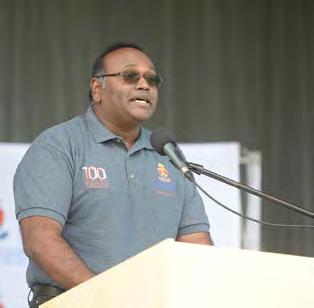
2 minute read
Teaching Development Promote Knowledge Production and Knowledge Sharing
The MakerSpace produced PPE
To minimise contact, a contactless collection service for library material was implemented, allowing users to request DLS material online, followed by communication between staff and the user to collect the material from the library. Material could then be returned via the drop boxes at all library sites or by registered mail or courier, after which these items were quarantined before being re-shelved.
As regulations eased, the libraries re-opened from Monday to Friday from 09:00 to 18:00 and Saturday from 09:00 to 13:00. However, study spaces were limited and had to be booked online in advance. The number of study seats available in each library was determined by its size and capacity, as well as by the regulations regarding the number of people allowed in a public space. Owing to higher health risks, the study centres and computer areas (on all campuses) remained closed. Meanwhile, information specialists provided virtual information and research support services to the University community, and students were able to receive training on a variety of information-related topics via Google Hangouts, Blackboard Collaborate or Zoom.
The Learning Centre supported library users by expanding its virtual services to include a mobile phone and WhatsApp service and supported digitisation and access and lending requests by collaborating with both teams to change the Ask and Chat services to the new LibAnswers and LibChat. The staff received virtual training on how to use the new system and supported each other virtually to deliver quality service to users. Each question was answered with care, correctness and immediacy where possible.
By collaborating with various teams, the DLS identified a need for online training courses in plagiarism and academic writing. A narrated PowerPoint presentation and clickUP course on plagiarism were created, allowing students to learn at their own pace. This course was first launched among sociology and informatics students, but active marketing and the online booking service could popularise it.
The MakerSpace in the DLS strives to address real-world problems innovatively through design and creation and provides students with the opportunity to experiment with different technologies for teaching, learning and research. On an academic level, it assisted with printing 3D ticks for the Faculty of Veterinary Science, prototype mosquito feeders and replicas of the Homo naledi skull, as well as sets of lion’s teeth and skulls with fracture wounds for teaching and learning purposes.
The MakerSpace Unit rose to the challenges that COVID-19 posed to the healthcare system. It produced 3D-printed personal protective equipment (PPE) for healthcare workers, including over 1 000 visor headbands and 2 500 ear savers. The visor frames were printed for the Faculty of Health Sciences and Steve Biko Academic Hospital as well as for the Netcare and Mediclinic groups.
In addition to these external collaborations, the MakerSpace still managed to address internal library requests, such as social distancing cones and hands-free door openers.
Teaching Development
The University is committed to implementing A National Framework for Enhancing Academics as University Teachers. The framework’s aims include:
• Promote knowledge production and knowledge sharing about university teaching and learning • Develop expectations of academics in their role as university teachers • Enable continuous professional development (CPD) for university teachers • Advance university teaching through leadership development • Establish and maintain university teacher development structures, organisations and resources
• Ensure that academics are recognised and rewarded for the work that they do as university teachers










